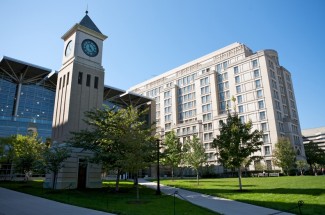Judge tosses Georgetown law grad's suit over school job fair ban

Georgetown University Law Center Campus/Karatershel via Wikimedia Commons.
A federal judge in Texas has tossed a $5 million lawsuit against Georgetown University’s law school by a graduate who claimed he was barred as an employer from a school hiring fair because of discrimination and retaliation.
U.S. District Judge Barbara Lynn of Dallas ruled that the Texas court did not have jurisdiction over the Washington, D.C.-based law school and another defendant, associate dean Nan Hunter, Texas Lawyer reports.
Plaintiff John Anthony Castro, received an LL.M. in international taxation from Georgetown about five years ago, according to Castro’s complaint and the school’s motion to dismiss. Castro was first banned from participating in the school’s hiring fair shortly before graduating. A half-decade later, the school banned him from the fair as an employer, the suit says.
The school says it banned Castro from the first job fair because of what appeared to be deliberate misrepresentations on his resume. Castro then reached out to potential employers directly and sought job fair interviews.
At that point, the university said, it discovered that Castro claimed to have been a cadet at the U.S. Military Academy at West Point, when in reality he attended a prep school for students not yet academically qualified to attend West Point. The school considered but decided against disciplining Castro.
Because of the prior resume issues, the school banned Castro from the job fair as an employer, the school says. The school also notes that Castro did not specify the date he was banned from the job fair as an employer. The school says it was in December 2015, and Castro’s suit is barred by the statute of limitations. The school also cited the jurisdictional issue in its dismissal motion.
Castro says there was no misrepresentation. He had been conditionally accepted to West Point, but he would be in a five-year program instead of a four-year track, with the first year at the prep school. Castro says he withdrew after the first year.
Lynn based her dismissal order on the jurisdictional issue.
Castro lived in Texas, but the defendants’ only contact with the state consisted of a phone call that Castro placed to the school to learn why he was banned from the job fair, Lynn said. That is not sufficient to establish jurisdiction, she concluded.
Write a letter to the editor, share a story tip or update, or report an error.


